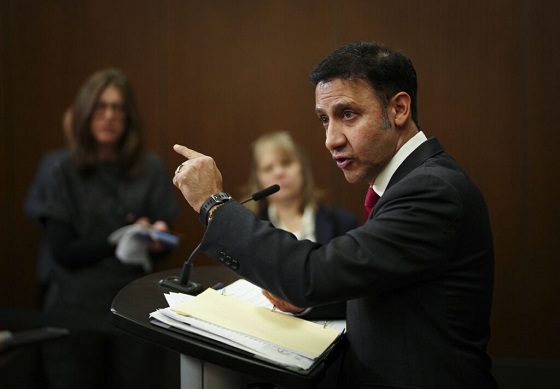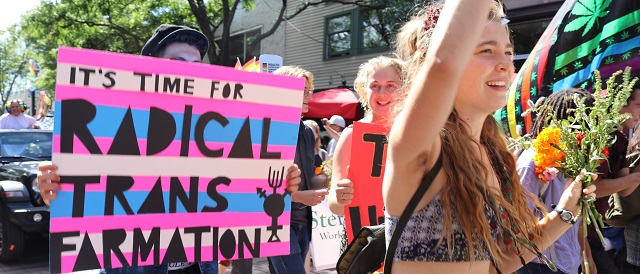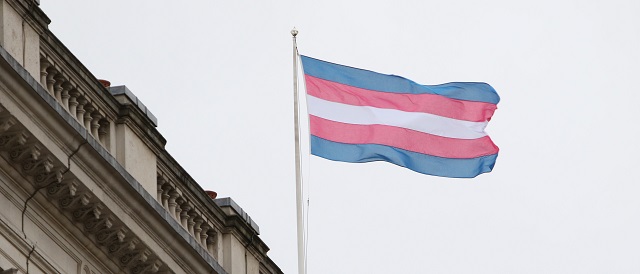National
Online Harms Act threatens free expression in Canada

News release from the Justice Centre for Constitutional Freedoms
This repudiates centuries of legal tradition that rightly reserved punishment for what a person had done, not for what a person might do. Under this new provision, a complainant can assert to a provincial court that they “fear” that someone will promote genocide, hate or antisemitism.
On February 26, Minister of Justice and Attorney General of Canada Arif Virani introduced Bill C-63, the Online Harms Act, in the House of Commons. The Online Harms Act is presented by the government as a means to promote the online safety of persons in Canada and reduce harmful content online. The Online Harms Act would impose severe penalties for online and offline hate speech, including life imprisonment, which is the most severe criminal punishment in Canada. This new legislation would establish a new Digital Safety Commission with power to enforce new regulations created by the federal cabinet. The Canadian Human Rights Commission would acquire new powers to prosecute and punish non-criminal hate speech.
Good intentions should be applauded
Although the Online Harms Act seriously threatens free expression in Canada, there are good intentions behind some of its provisions. It is a laudable goal to force online platforms to remove revenge porn and other non-consensual sharing of intimate images, content that bullies children, content that sexually victimizes children, content that encourages children to harm themselves, and content that incites violence, terrorism or hatred.
Unnecessary duplication of the Criminal Code
However, good intentions do not justify passing additional laws that duplicate what is already prohibited by Canada’s Criminal Code. Additional laws that duplicate existing laws are a poor substitute for good law enforcement.
Section 162.1(1) of Canada’s Criminal Code already prohibits online and offline publication of an intimate image without consent. Section 163 already prohibits publication of obscene materials and child pornography. Thus, it is already illegal to post online content that sexually victimizes a child or revictimizes a survivor.
Section 264(1) already prohibits criminal harassment. Section 319(1) already prohibits the public incitement of hatred towards a group that is identifiable by race, ethnicity, religion, sex, sexual orientation, gender identity, gender expression and other personal characteristics. Section 59(1) criminalizes sedition: advocating the use of force to achieve governmental change within Canada. Sections 83.21 and 83.22 criminalize instructing to carry out terrorist activity; any online content that incites terrorism is already illegal.
Further, Section 22 of Canada’s Criminal Code prohibits counselling, procuring, soliciting or inciting another person “to be a party to an offence.” Any person who counsels, procures, solicits or incites another person to be a party to an offence will be found guilty if the person receiving such counsel commits the offence in question. This applies to terrorism and other violent crimes, and even to minor criminal offenses like shoplifting. Further, section 464 of the Criminal Code criminalizes counselling another person to commit an offence even if that offence is not committed.
Those who support the Online Harms Act should explain why they believe that existing legislation is inadequate to address “harmful” online expression.
New government bodies to censor online speech
If passed into law, the Online Harms Act will create a new Digital Safety Commission to enforce compliance with new regulations created by the federal cabinet. This Digital Safety Commission will have the power to regulate nearly any person or entity operating as a “social media service” in Canada. Any person or social media service found to have permitted “harmful content” would face penalties. The severity of the penalties would be established by the federal cabinet. The creators and users of online content will self-censor to avoid the risk of running afoul of the new regulations and government-imposed censorship. The Online Harms Act provides that an Order of the Digital Safety Commission may be converted into an Order of the Federal Court and enforced like a Court Order. This could result in people operating social media services being fined and imprisoned for contempt of court if they refuse to censor Canadians’ speech.
Pre-emptive punishment for crimes not committed
The Online Harms Act, if passed into law, will add section 810.012 to the Criminal Code, which will permit pre-emptive violations of personal liberty when no crime has been committed. This repudiates centuries of legal tradition that rightly reserved punishment for what a person had done, not for what a person might do. Under this new provision, a complainant can assert to a provincial court that they “fear” that someone will promote genocide, hate or antisemitism. If the judge believes that there are “reasonable grounds” to justify the fear, the court can violate the liberty interests of the accused citizen by requiring her or him to do any or all of the following:
- wear an ankle bracelet (electronic monitoring device)
- obey a curfew and stay at home, as determined by the judge
- abstain from alcohol, drugs, or both
- provide bodily substances (e.g. blood, urine) to confirm abstinence from drugs or alcohol
- not communicate with certain designated persons
- not go to certain places, as determined by the judge
- surrender her or his legally owned and legally required firearms
In other words: a citizen who has not committed any crime can be subjected to one or more (or all) of the above conditions just because someone fears that that person might commit a speech crime in future. Further, if the person who has committed no crime fails to agree to these court-ordered violations of her or his personal liberty, she or he could be sentenced to up to two years in prison.
Our criminal justice system is not supposed to function this way. Violating the liberty of citizens through pre-emptive punishment, when no crime has been committed (and quite possibly when no crime will be committed), is a radical departure from centuries of common law tradition. The respect that our legal system has for individual rights and freedoms means that an accused person is presumed innocent until proven guilty by way of a fair trial, held before an independent and impartial court. We do not punish the innocent, nor do we restrict their liberty based on what they might do. The mere fear that harmful expression may occur is not a legitimate basis for court-ordered imprisonment or other conditions that violate personal liberty.
Life imprisonment for words spoken
For the existing Criminal Code offence of advocating for genocide, the Online Harms Act would raise the maximum penalty from five years in jail to life imprisonment. Free societies recognize the distinction between speech and actions. The Online Harms Act blurs that distinction.
Considering the inherent difficulty in determining whether a person has actually “advocated for genocide,” the punishment of a five-year prison term is already an adequate deterrent for words alone.
Federal cabinet can censor speech without input from Parliament
The Online Harms Act, if passed into law, would give new powers to the federal cabinet to pass regulations (which have the same force of law as legislation passed by Parliament) that place prohibitions or obligations on social media services. This includes passing regulations that impose fines or other consequences (e.g., the removal of a licence or the shutting down of a website) for non-compliance. New regulations can be created by the federal cabinet in its sole discretion, and do not need to be debated, voted on or approved by Parliament. Parliamentary proceedings are public. Any political party, or even one single MP, can raise public awareness about a Bill that she or he disagrees with, and can mobilize public opposition to that Bill. Not so with regulations, which are deliberated in secret by the federal cabinet, and that come into force without any public consultation or debate.
Apart from a federal election held once every four years, there is no meaningful way to hold cabinet to account for the draconian censorship of social media services by way of regulations and the harsh penalties that may be imposed for hosting “harmful content.” The federal cabinet can also decide what number of “users” the “social media service” needs to have in order to trigger federal regulation of content, or the federal cabinet can simply designate a social media service as regulated, regardless of the number of its users.
New censorship powers for Canadian Human Rights Commission
The Online Harms Act, if passed into law, will give the Canadian Human Rights Commission new powers to prosecute and punish offensive but non-criminal speech by Canadians if, in the subjective opinion of unelected and unaccountable bureaucrats, they deem someone’s statement to be “hateful.” The Online Harms Act will empower Canadians offended by non-criminal expression to file complaints against their fellow citizens.
Those who are prosecuted by the Human Rights Commission cannot defend themselves by establishing that their supposedly “hateful” statement is true, or that they had reasonable grounds for believing that their statement was true.
Those found guilty by the Canadian Human Rights Tribunal can be required to pay as much as $50,000 to the government, plus up to $20,000 to the person(s) designated as “victims” by the Canadian Human Rights Tribunal. These significant financial penalties will discourage or eliminate necessary discussion on controversial but important issues in our society.
Advocates for censorship often stress the fact that human rights prosecutions are not criminal. It is true that those found guilty of violating vague speech codes by the Canadian Human Rights Tribunal do not suffer the consequences of a criminal record. However, those who are prosecuted for expressing their beliefs face the difficult choice of having to spend tens of thousands of dollars on legal bills or having to issue an abject apology. Regardless of whether they choose to defend themselves against the complaint or not, they may still be ordered to pay up to $20,000 to the offended party or up to $50,000 to the government, or up to $70,000 to both.
Many Canadians will continue to exercise their Charter-protected freedom of expression, but many will self-censor to avoid the risk of being prosecuted by the Canadian Human Rights Commission.
Anonymous complaints: no right to face one’s accuser
The Online Harms Act, if passed into law, will allow complaints to be filed against Canadians in secret, such that the citizen who is prosecuted by the Canadian Human Rights Commission loses the ancient and well-founded right to face and question one’s accuser. This repudiates centuries of common law tradition requiring the legal process to be public and transparent.
The pretext for eliminating this necessary and long-standing legal protection is that some complainants might be subjected to “threats, intimidation or discrimination.” This ignores the fact that threats and intimidation are already Criminal Code offences, and any illegal discrimination can be addressed by way of a new and separate complaint. Those filing complaints about expression should be accountable for their decision to do so; this is an inherent and necessary component of both criminal and civil legal proceedings.
No need to establish that someone was harmed
If the Online Harms Act is passed into law, the Canadian Human Rights Commission will not even require a victim in order to prosecute a citizen for what she or he has said. For example, a man in Vancouver can file an anonymous complaint against a woman in Nova Scotia who made disparaging online remarks about a mosque in Toronto, regardless of whether that mosque’s members were harmed, or even offended, by the post. No actual victims are required for the Canadian Human Rights Commission to find guilt or to impose penalties. Nor does a victim need to prove that he or she suffered loss or damage; feeling offended by alleged “hate” is all that is needed to become eligible for financial compensation.
Conclusion
For reasons set out here above, the Online Harms Act will harm freedom of expression in Canada if it is passed into law. Many Canadians will self-censor to avoid being prosecuted by the Canadian Human Rights Commission. Canadians who do not self-censor, by practicing courage and by continuing to exercise their Charter-protected freedom of expression, will still see their online expression removed from the internet by the operators of social media websites and platforms. These operators will seek to avoid running afoul of Mr. Trudeau’s new regulations. Everyone will live in fear of the Digital Safety Commission.
The Justice Centre urges all Members of Parliament to vote against this legislation.
National
Trudeau again blames ‘climate change’ for mostly man-made wildfires

From LifeSiteNews
Trudeau and the media which his government funds appear intent on blaming Canada’s wildfires on ‘climate change’ in what seems to be an attempt to justify radical public policy.
Prime Minister Justin Trudeau and his Liberals are once again blaming Canadian wildfires on “climate change” despite most being man-made.
In a May 10 press release, Prime Minister Justin Trudeau and Deputy Prime Minister Chrystia Freeland lectured Canadians on the so-called dangers of “climate change” amid Canada’s wildfire season, apparently ignoring that data has revealed that most wildfires are man-made.
“Climate change is here, and we’re making sure our communities are ready,” Trudeau stated.
“Last year was the worst wildfire season in Canadian history, and climate change is only causing more frequent and more extreme wildfires,” Freeland claimed.
In addition to the Liberal government, mainstream media outlets have also started publishing articles attributing Canada’s wildfires to “climate change.”
“The seeds of fire activity were sown over the winter and in past years as the world continues to warm because of human-driven climate change,” CNN claimed in a May 15 article.
Despite the claims of the Trudeau government, the Alberta Wildfire Status Dashboard, which tracks wildfires in the province, found that 232 (72.96%) of the wildfires started this year have been linked to human activity. On the other hand, only 1 (0.31%) was caused by lightning, while 85 (26.73%) remain under investigation.
Last month, Alberta Minister of Forestry and Parks Todd Loewen revealed that his department estimates that most of the province’s wildfires this year are man-made.
Additionally, an April study revealed that while global temperatures have “moderately” increased since 1950, the claim that extreme weather events are significantly increasing is unsupported by scientific evidence.
Telling Canadians the same lies as in 2023
Indeed, Trudeau and the media his government funds appear intent on blaming Canada’s wildfires on “climate change” regardless of the facts, similar to their tactics in spring 2023 when Canada faced one of its worst fire seasons.
“Rise in extreme wildfires linked directly to emissions from oil companies in new study,” Canadian Broadcasting Corporation (CBC), which gets 70 percent of its operating budget via tax dollars from the federal government, claimed at the time.
However, similar to now, Trudeau’s claims were unfounded and contradicted both research and wildfire data.
Indeed, despite claims that wildfires have drastically increased due to “climate change,” 2023 research revealed that wildfires have decreased globally while media coverage has spiked 400 percent.
Furthermore, many of the fires last spring and summer were discovered to be caused by arsonists and not “climate change.”
Last year, the Royal Canadian Mounted Police (RCMP) arrested and charged suspected arsonists for allegedly lighting fires across the country, including in the Yukon, British Columbia, and Alberta.
In Quebec, satellite footage also showed the mysterious simultaneous eruption of several blazes across the province, sparking concerns that the fires were a coordinated effort by arsonists.
Why push the ‘climate change’ narrative?
Trudeau’s determination to push the claim that the fires are unprecedentedly dangerous and caused by “climate change” appears by critics to be nothing but an attempt to pass further regulations on natural resources.
The Trudeau government has continued to insist on so-called net zero carbon policies, seeking a complete elimination of the fossil fuel industry in the future.
The reduction and eventual elimination of the use of so-called “fossil fuels” and a transition to unreliable “green” energy has also been pushed by the World Economic Forum (WEF) – the globalist group behind the socialist “Great Reset” agenda – an organization with which Trudeau and some in his cabinet are involved.
While Trudeau’s plan has been pushed under the guise of “sustainability,” his intention to decrease nitrous oxide emissions by limiting the use of fertilizer has been criticized by farmers. They say this will reduce profits and could even lead to food shortages.
Automotive
Governments in Canada accelerate EV ‘investments’ as automakers reverse course

From the Fraser Institute
Evidence continues to accrue that many of these “investments,” which are ultimately of course taxpayer funded, are risky ventures indeed.
Even as the much-vaunted electric vehicle (EV) transition slams into stiff headwinds, the Trudeau government and Ontario’s Ford government will pour another $5 billion in subsidies into Honda, which plans to build an EV battery plant and manufacture EVs in Ontario.
This comes on top of a long list of other such “investments” including $15 billion for Stellantis and LG Energy Solution, $13 billion for Volkswagen (with a real cost to Ottawa of $16.3 billion, per the Parliamentary Budget Officer), a combined $4.24 billion (federal/Quebec split) to Northvolt, a Swedish battery maker, and a combined $644 million (federal/Quebec split) to Ford Motor Company to build a cathode manufacturing plant in Quebec.
All this government subsidizing is of course meant to help remake the automobile, with the Trudeau government mandating that 100 per cent of new passenger vehicles and light trucks sold in Canada be zero-emission by 2035. But evidence continues to accrue that many of these “investments,” which are ultimately of course taxpayer funded, are risky ventures indeed.
As the Wall Street Journal notes, Tesla, the biggest EV maker in the United States, has seen its share prices plummet (down 41 per cent this year) as the company struggles to sell its vehicles at the pace of previous years when first-adopters jumped into the EV market. Some would-be EV makers or users are postponing their own EV investments. Ford has killed it’s electric F-150 pickup truck, Hertz is dumping one-third of its fleet of EV rental vehicles, and Swedish EV company Polestar dropped 15 per cent of its global work force while Tesla is cutting 10 per cent of its global staff.
And in the U.S., a much larger potential market for EVs, a recent Gallup poll shows a market turning frosty. The percentage of Americans polled by Gallup who said they’re seriously considering buying an EV has been declining from 12 per cent in 2023 to 9 per cent in 2024. Even more troubling for would-be EV sellers is that only 35 per cent of poll respondents in 2024 said they “might consider” buying an EV in the future. That number is down from 43 per cent in 2023.
Overall, according to Gallup, “less than half of adults, 44 per cent, now say they are either seriously considering or might consider buying an EV in the future, down from 55 per cent in 2023, while the proportion not intending to buy one has increased from 41 per cent to 48 per cent.” In other words, in a future where government wants sellers to only sell EVs, almost half the U.S. public doesn’t want to buy one.
And yet, Canada’s governments are hitting the gas pedal on EVs, putting the hard-earned capital of Canadian taxpayers at significant risk. A smart government would have its finger in the wind and would slow down when faced with road bumps. It might even reset its GPS and change the course of its 2035 EV mandate for vehicles few motorists want to buy.
Author:
-

 City of Red Deer2 days ago
City of Red Deer2 days agoCity Council paving the way for more house suites, backyard suites, tiny homes, and duplexes
-

 Opinion2 days ago
Opinion2 days agoCanada’s fertility, marriage rates plummet to record lows: report
-

 Uncategorized1 day ago
Uncategorized1 day agoRCMP recruitment failure has Alberta advocacy group calling for Provincial Police Service
-

 COVID-1917 hours ago
COVID-1917 hours agoJapan’s most senior cancer doctor: COVID shots are ‘essentially murder’
-

 Automotive6 hours ago
Automotive6 hours agoGovernments in Canada accelerate EV ‘investments’ as automakers reverse course
-

 Health1 day ago
Health1 day agoPrivate Footage Reveals Leading Medical Org’s Efforts To ‘Normalize’ Gender Ideology
-

 Health1 day ago
Health1 day agoTHE WPATH TAPES: Behind-The-Scenes Recordings Reveal What Top Gender Doctors Really Think About Sex Change Procedures
-

 illegal immigration2 days ago
illegal immigration2 days agoPanama’s Incoming President Wants To Shut Down His Country’s Most Treacherous Route For Migrants — But Will It Work?







